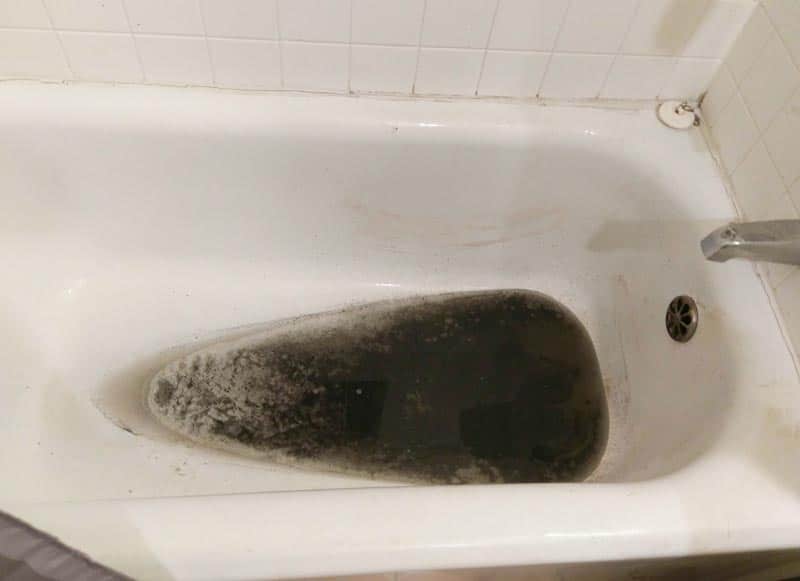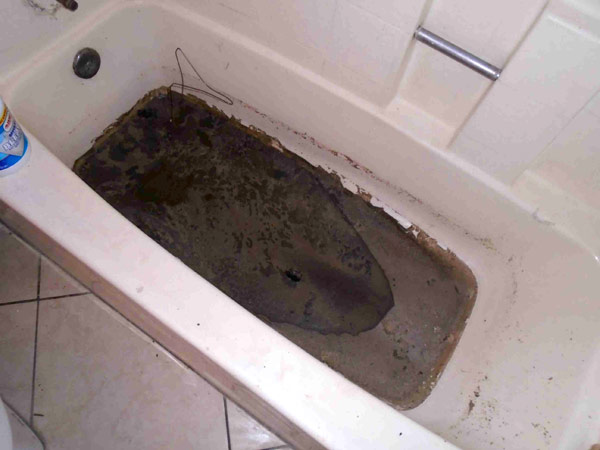Unveiling the Causes of Discharge in the Bathtub
Unveiling the Causes of Discharge in the Bathtub
Blog Article
Do you find yourself on the lookout for help and advice around Water Coming up Bathtub Drain?

Sewer backup in the bath tub can be an upsetting and unhygienic problem for any kind of home owner. Not just is it troublesome, yet it additionally poses serious wellness risks and indicates underlying concerns with the plumbing system. Understanding why sewage is turning up via the bath tub is essential for taking suitable action to address the issue efficiently.
Introduction to the Concern
Understanding the Problem
When sewer draws back up into the tub, it's a clear sign of an issue with the drain system. The wastewater that ought to be flowing far from your home is instead finding its way back into your space, which can result in considerable damage and carcinogen.
Potential Reasons
Numerous aspects can contribute to sewer backup in the tub. From clogs in the drain line to concerns with the plumbing facilities, recognizing the source is necessary for locating an option.
Common Factors for Sewer Back-up
Blockages in the Sewage System Line
One of one of the most typical causes of sewer back-up is an obstruction in the sewer line. This can occur as a result of the buildup of particles, oil, or foreign things in the pipelines, stopping appropriate circulation and causing sewer to back up right into your tub.
Tree Origin Breach
Tree origins seeking dampness and nutrients can penetrate drain lines with small splits or joints. Over time, these origins can grow and increase, triggering significant damage to the pipelines and resulting in sewer back-up problems.
Aging Framework
Older homes may have obsoleted plumbing systems that are more prone to corrosion, fractures, and degeneration. As pipelines age, they become much more prone to leakages and obstructions, enhancing the possibility of sewage back-up occurrences.
Heavy Rainfall or Flooding
Throughout periods of heavy rainfall or flooding, the sewer system may become overloaded with excess water, creating backups and overflows. This can result in sewer backing up right into bathtubs and various other components inside the home.
Wellness Threats Associated with Sewage Back-up
Contamination of Water System
Sewage back-up can pollute the water system in your home, posing a serious wellness danger to you and your family. Direct exposure to polluted water can bring about stomach issues, skin infections, and other diseases.
Spread of Disease
Sewer includes harmful bacteria, infections, and bloodsuckers that can create a range of diseases, including liver disease, cholera, and gastroenteritis. Entering contact with sewage or infected surface areas places you in jeopardy of infection.
Mold and mildew Growth
Dampness from sewage back-up can create ideal conditions for mold and mildew development in your house. Mold and mildew spores can intensify respiratory system problems and cause allergies in delicate individuals, making punctual cleaning essential.
Indications of Sewer Back-up
Foul Odors
Undesirable smells originating from drains pipes or fixtures, especially in the restroom, might indicate sewage back-up issues. These odors are commonly solid and persistent, indicating a trouble that calls for prompt attention.
Slow Draining Fixtures
Tubs, sinks, and commodes that drain pipes slowly or not at all could be experiencing sewer backup. If multiple fixtures are influenced concurrently, it's likely that the issue stems from a common factor, such as the main sewage system line.
Gurgling Noises
Strange gurgling or bubbling sounds originating from drains when water is running in other places in your home are a measure of air trapped in the plumbing system. This air accumulation can arise from sewage back-up and should be explored immediately.
Immediate Actions to Take
Switching Off Water System
In case of sewer back-up, it's vital to switch off the water supply to avoid additional contamination and damages. Find the main water shutoff valve in your home and shut it off until the concern can be fixed.
Contacting a Professional Plumber
Handling sewer backup is not a do it yourself job. Contact a certified plumber with experience in handling sewage-related concerns to evaluate the circumstance and carry out essential fixings or cleanups.
Preventing Contact with Infected Water
Till the sewage backup is solved, prevent contact with infected water to stop the spread of germs and virus. Use protective gear if you need to be in the afflicted area and clean your hands completely afterward.
Safety nets
Routine Upkeep of Drain Lines
Arrange routine assessments and maintenance of your sewage system lines to recognize and attend to possible concerns before they escalate into major problems. This can include cleaning out particles, evaluating for tree root invasion, and fixing any broken pipes.
Installing Bayou Shutoffs
Consider mounting bayou valves in your plumbing system to stop sewage from flowing back into your home throughout periods of heavy rainfall or flooding. These shutoffs immediately close when water draws back up, securing your building from contamination.
Correct Disposal of Household Waste
Stay clear of purging anything other than bathroom tissue and human waste down the toilet to avoid obstructions and blockages in the sewage system line. Dispose of grease, oil, and other household chemicals effectively to minimize the risk of plumbing problems.
Cleaning Up After Sewage Backup
Sanitation Procedures
Completely sanitize and sterilize impacted locations after sewage backup to get rid of hazardous germs and avoid mold growth. Use ideal cleansing products and protective equipment to make certain secure and efficient clean-up.
Reconstruction of Affected Areas
Fix any type of damages to floor covering, walls, or fixtures caused by sewer back-up. Depending upon the level of the damage, you might require to replace carpets, drywall, or various other products to restore your home to its pre-loss problem.
Why is There Sewage Coming Up Through the Bathtub
Sewage in your bathtub is a major problem that can make you want to abandon the bathroom for good. You don’t have to. However, it is important to identify the source of the issue and take the necessary steps to resolve it in order to avoid any health risks and property damage. In this article, we will discuss what could be causing sewage to back up through your bathtub so you can take action quickly and effectively.
The Main Reason For Sewage Backup in The Bathtub
All the sinks and toilets in your home connect to different pipes that lead to the main sewer line. The sewer line then connects to the municipal sewer system. This connection works seamlessly on a daily basis, but there can sometimes be a problem with the main sewer line.
The most common cause of sewage backup is a clogged or blocked main sewer line. The main sewer line can be clogged due to the accumulation of debris, tree roots or grease buildup, or other materials. Another possible cause is a collapsed pipe. When this happens, your toilets and sinks won’t be able to drain properly. This is when sewage starts backing up through the bathtub. If the problem has been occurring for some time now, it might be time to consult with a plumber as there may be more severe damage that needs fixing.
How Can You Tell if it’s Coming From Your Sewer Line?
If you’re experiencing a sewage backup in your bathtub, then you can use a few simple methods to determine if it is coming from the main sewer line. First, try to unclog the tub drain with a plunger or an auger and see if that helps. If not, then inspect all of the drains in your house and check if there is any blockage in them. If some of the other drains are not working fine, then it’s likely the problem is with your main sewer line.
Common Signs of a Clogged Main Sewer Line
If you suspect that your main sewer line is blocked, then there are a few common signs to look out for. Frequent clogs in your home are a sure sign of a clogged sewer line. You can also check for slow drainage from all the plumbing fixtures.
Slow Drains
If you notice that it takes longer for your sinks and toilets to drain, then this could be a sign of a clogged main sewer line.
Frequent Clogs
Another common sign is that your drains or toilets become clogged almost all of the time. If this happens, then it could be a sign that the main sewer line is blocked.
Water Backup
Do you notice water or sewage coming back up from any of the drains in your home? If your answer is yes, you may have a clogged main sewer line.
Sinkholes
If you’ve noticed sinkholes in your yard or overflowing sewage from the ground, you may be facing a blocked sewer line issue.
Your Shower or Sink Makes Gurgling Noises
Have you noticed gurgling noises coming from your sink or shower lately? These are typically signs of a blocked sewer line and should be checked out immediately.
How to Prevent a Main Sewer Line Clog
Once you’ve identified that your main sewer line is clogged, it’s important to take steps to prevent it from happening again. The best way to do this is to avoid putting any solid material that can clog the drain, such as grease and other debris. You should also be mindful of what you flush down your toilet. In addition, you should schedule regular maintenance for your main sewer line. This will help keep it clear and free from clogs or backups.
What Should You do if You Notice Sewage Backing up Through The Bathtub?
If you’ve noticed sewage backing up through the bathtub, then it is important to call a professional plumber immediately. A plumber can inspect the situation and determine what the cause is, such as a blocked main sewer line. They will also be able to advise you on how best to fix the issue. In some cases, a simple drain cleaning may be all that is needed.
However, if the blockage is severe, then your plumber may need to use more advanced methods to clear the blockage.
No matter what, it is important to always call a professional plumber if you experience any kind of sewage backup. They will be able to assess the situation and provide you with a solution that is best for your home.
https://baylorinc.com/blog/why-is-there-sewage-coming-up-through-the-bathtub/

Hopefully you enjoyed reading our piece about Water Coming up Bathtub Drain. Thanks for taking the time to read through our piece. Make sure you pause to share this article if you enjoyed it. Bless you for being here. Don't hesitate to pay a visit to our site back soon.
Call Today
Report this page